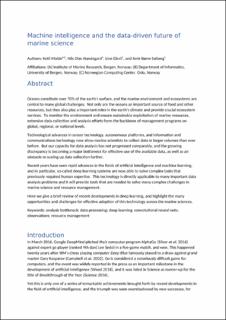Machine intelligence and the data-driven future of marine science
Peer reviewed, Journal article
Submitted version
Permanent lenke
https://hdl.handle.net/11250/2685476Utgivelsesdato
2019Metadata
Vis full innførselSamlinger
- Articles [3001]
- Publikasjoner fra CRIStin [3025]
Sammendrag
Oceans constitute over 70% of the earth’s surface, and the marine environment and ecosystems are central to many global challenges. Not only are the oceans an important source of food and other resources, but they also play a important roles in the earth’s climate and provide crucial ecosystem services. To monitor the environment and ensure sustainable exploitation of marine resources, extensive data collection and analysis efforts form the backbone of management programmes on global, regional, or national levels. Technological advances in sensor technology, autonomous platforms, and information and communications technology now allow marine scientists to collect data in larger volumes than ever before. But our capacity for data analysis has not progressed comparably, and the growing discrepancy is becoming a major bottleneck for effective use of the available data, as well as an obstacle to scaling up data collection further. Recent years have seen rapid advances in the fields of artificial intelligence and machine learning, and in particular, so-called deep learning systems are now able to solve complex tasks that previously required human expertise. This technology is directly applicable to many important data analysis problems and it will provide tools that are needed to solve many complex challenges in marine science and resource management. Here we give a brief review of recent developments in deep learning, and highlight the many opportunities and challenges for effective adoption of this technology across the marine sciences.
